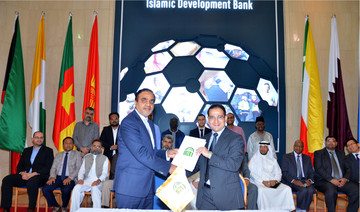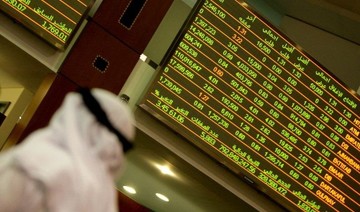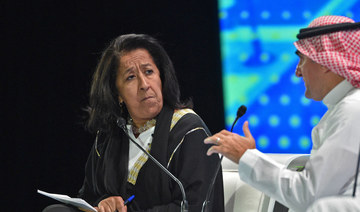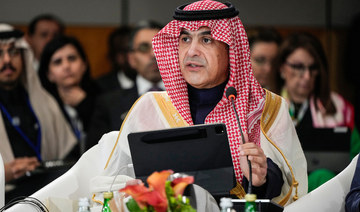BARCELONA: Later this year, what purports to the world’s first digital sukuk will launch, bringing Sharia-compliant social impact investing to the masses.
Blossom Finance — an Indonesia-based, US-owned and regulated company that’s guided by one of the Gulf’s most renowned experts in Islamic finance — hopes its pioneering products can enable retail investors to benefit from the kinds of gains usually only enjoyed by institutions and the ultra-wealthy.
Digital sukuk can also help steer Islamic finance back toward a higher purpose of supporting the communities in which it operates.
“Islamic finance has yet to realize its true value proposition. Most of it is built on replicating conventional finance, which may be a necessary step but isn’t particularly benefitting society,” said Khalid Howladar, chief strategy and risk officer at Blossom Finance.
“Maybe one person can’t change the world, but I saw within Blossom the scope to help take Islamic Finance to the next level and to support a more investment-based — versus debt-based — economy.
“The core premise of Blossom is to be an active social impact investing platform that will use digital sukuk to raise funds from platform members worldwide.”
So, how will the company’s digital sukuk work?
There is no paper. Everything is online and digital at blossomfinance.com. After creating their user account, members will be able to view various projects (new and old) on the Blossom portal that are funded by digital sukuks. They can invest in any of these sukuk and trade them online.
Blossom’s debut digital sukuk will launch before year-end and aims to return around 8-10 percent over its one-year duration. However, unlike the bulk of the global sukuk market, this will be a genuine profit-sharing instrument with variable — not fixed — returns.
With potential investors from Chile to New Zealand registering their interest in the sukuk, Blossom hopes to raise around $500,000 to $1 million. The proceeds will be passed to an Indonesian microfinance institution, which will then use it to finance budding micro-entrepreneurs.
“We would rather the sukuk be relatively short in order to reduce the risk, at least at the outset,” said Howladar, who is also managing director and founder of Dubai’s Acreditus, a boutique risk, ratings, regulatory and Islamic finance advisory practice.
“It will also help instil good practices in the microfinance institution as — for the first sukuk — they need the money back after the year. The microfinance institution can then finance the entrepreneurs again providing all requirements are met.”
A second sukuk, which will be written on an Ethereum blockchain and is slated to launch in the first half of 2019, will also be focused on Indonesia’s microfinance industry. Blossom may then issue a digital sukuk to fund a recycling firm that’s found an innovative way to safely dispose of plastic and medical waste, with plastic residue used to lay roads. A fourth potential project is for an asset-backed sukuk that would fund a hospital expansion.
Previously, the administrative requirements — such as taking customer details, allocating unique and unforgeable reference numbers and distributing profits – would have required an expensive corporate and technology infrastructure to support the sukuk.
“As a result, your investment sizes would have to be tens if not hundreds of thousands of dollars per person, because you needed scale to make it work,” said Howladar, who was formerly Moody’s Global Head of Islamic Finance and GCC Banks.
As profit-sharing instruments, the sukuk do not provide guaranteed returns of profit or capital, but that added risk is reflected in the higher potential profits to be made from investing. The minimum investment size will vary according to the sukuk and will start from around $100 for blockchain-based sukuk, while for the first digital sukuk it will likely be about $5,000 reflecting the current real-world onboarding costs.
“Only when we are fully operational can we use tech to bring the subscription threshold down,” said Howladar.
“Hopefully Blossom’s platform can help democratize the investment process so that you don’t need to have a brokerage account or access to a ‘Swiss’ private bank to invest your money in markets that over the long term generate returns that are typically more than bank deposits.”
The sukuk will have an Indonesian counterparty bank that can receive investors’ funds.
World first digital sukuk targets Bitcoin generation
World first digital sukuk targets Bitcoin generation
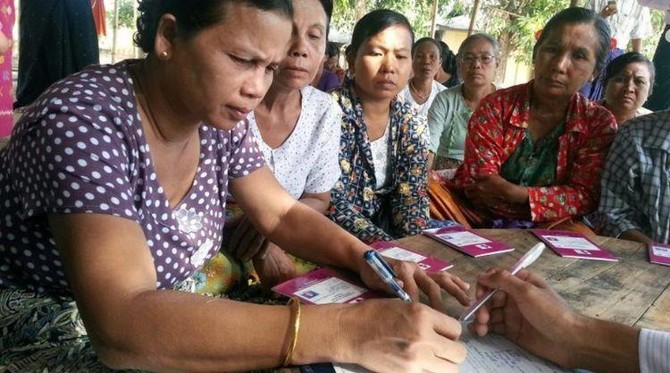
- Blossom Finance hopes its pioneering products can enable retail investors to benefit from the kinds of gains usually only enjoyed by institutions and the ultra-wealthy
- After creating their user account, members will be able to view various projects (new and old) on the Blossom portal that are funded by digital sukuks
Islamic finance industry projected to grow in 2024-2025
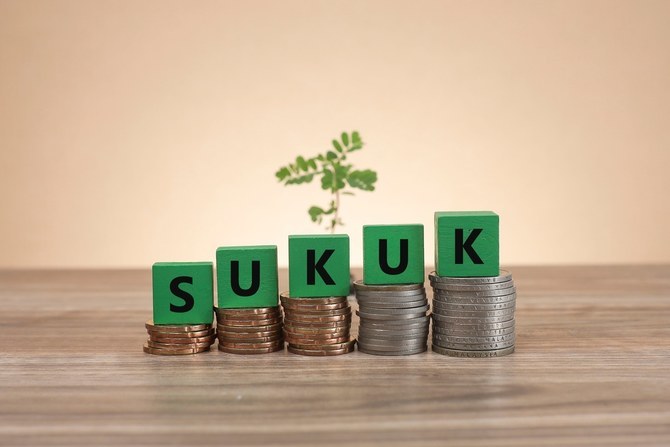
RIYADH: The Islamic finance industry is projected to grow globally in 2024-2025 with total assets likely to witness single-digit growth driven by economic diversification efforts, a report said.
It predicted that sukuk issuance globally would hover between $160 billion and $170 billion in 2024, representing a steady momentum from $168.4 billion in 2023 to $179.4 billion in 2022.
In its latest analysis, credit rating agency S&P Global highlighted that the industry grew by 8 percent and 8.2 percent in 2023 and 2022, respectively, stemming from growth in banking assets and the sukuk industry.
According to the US-based firm, Islamic banking assets grew 56 percent in 2023 compared to 72 percent in 2022.
Financial institutions across the Gulf Cooperation Council region accounted for 86 percent of the reserve increase in 2023, with Saudi Arabia becoming the chief contributor, having generated 56.7 percent of the maturation.
“We expect the implementation of Vision 2030 and growth in corporate and mortgage lending to continue supporting the Islamic finance industry over the next 12-24 months. In addition, the UAE showed a stronger contribution in 2023 thanks to the good performance of the non-oil sector,” the report noted.
It added: “Elsewhere, we observed some growth, particularly in Turkiye and Indonesia. The performance in Malaysia and Turkiye was somewhat tempered by the depreciation of the ringgit and the lira.”
According to the US-based firm, the issuance of this Shariah-compliant debt product began on a strong footing in 2024, with Saudi Arabia becoming a key contributor to the performance.
“The drop in issuance volumes in 2023, which mainly resulted from tighter liquidity conditions in Saudi Arabia’s banking system and Indonesia’s lower fiscal deficit, was somewhat compensated by an increase in foreign currency-denominated sukuk issuance,” S&P Global said in the report.
It added: “The market has started 2024 on a strong footing, with total issuance reaching $46.8 billion at March 31, 2024, compared with $38.2 billion at March 31, 2023.”
The analysis highlighted that the sukuk market will continue its growth momentum in the near term as financing needs in core Islamic finance countries remain high, given ongoing economic transformation programs, especially in countries like Saudi Arabia.
“We expect the sukuk market to fill in some of these needs. Specifically, we see some opportunities in the structured finance space with banks tapping the sukuk market to refinance their sizable mortgage books,” said the agency in the report.
The agency highlighted that the drive for digitalization and sustainability initiatives have yielded mixed results in the Islamic finance industry.
“While opportunities related to sustainable finance are significant as the industry is concentrated in oil exporting countries, progress has been relatively slow and limited in the global context,” according to S&P Global.
However, the report noted that digitalization has helped the banking side of the industry.
S&P Global concluded the study by saying that the future of Islamic finance is sustainable, collaborative, and digital.
“It is sustainable thanks to the alignment between Shariah principles, overarching pillars of sustainability, and the value proposition of Islamic finance that capture more than just financial objectives,” said the report.
According to the analysis, the future of Islamic finance is collaborative because stakeholders do not want to disrupt the industry equilibrium and erase the development achieved over the past 50 years.
The report added that digitalization will also impact Islamic finance in the coming years, as leveraging emerging technologies could help the industry enhance its efficiency and ultimately increase its value proposition for investors and issuers.
Earlier this month, another report released by Fitch Ratings noted that global outstanding sukuk expanded 10 percent year on year to reach $867 million at the end of the first quarter of 2024.
The credit rating agency attributed the growth of this Islamic debt product to funding and refinancing needs, and the development of the debt capital market in the GCC region.
The report, however, added that new Shariah requirements that could alter credit risk, geopolitical uncertainties and high oil prices, could affect the growth of the sukuk market this year.
Saudi Aramco is looking at investment in new energies outside of the Kingdom, CEO says
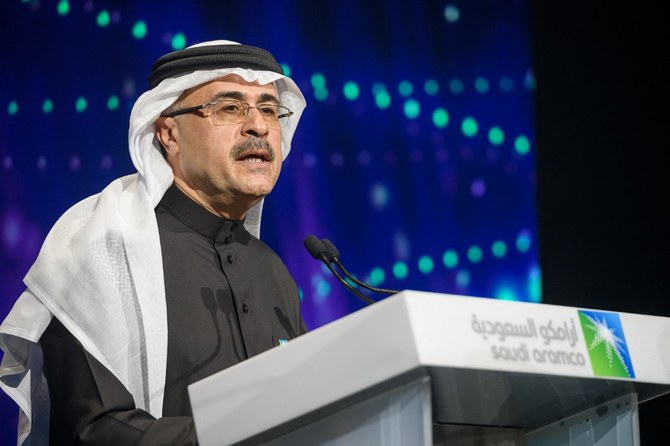
DUBAI: Saudi Arabia’s state-oil giant Aramco is looking at investments right now in new energies outside of the Kingdom, CEO Amin Nasser said on Monday at the sidelines of a World Economic Forum special meeting held in Riyadh.
Malaysia targeting Gulf trade and tech ties at WEF, minister says
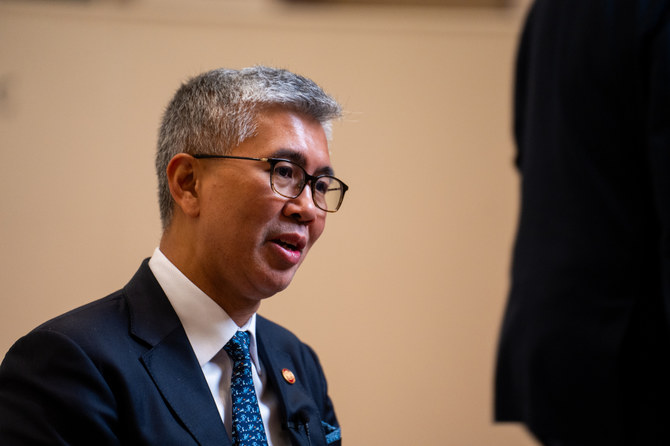
- Malaysia is also exploring investment and technology-sharing deals in artificial intelligence and the digital economy
RIYADH: Malaysia is looking to partner with Gulf-based companies on renewable energy, the country’s minister of investment has said.
Speaking to Arab News at the two-day World Economic Forum meeting in Riyadh, Tengku Zafrul Aziz said that about 50 Malaysian companies are in discussions to invest in renewable energy and share technologies.
“There is a lot of demand now for green renewable energy. We want partners who can not only go by funding, as we have funding capabilities, but also more in terms of technology and know-how,” he said.
“Many GCC companies who have already invested in this area are willing to share technology pools and invest with our funds, our companies, and our sovereign wealth fund.”
Malaysia is also exploring investment and technology-sharing deals in artificial intelligence and the digital economy.
“We also got interest from GCC companies on that matter and they have invested a lot in this technology. Now we want to learn and partner, so that the infrastructure that we build using digital platforms can be applied using applications that some of these companies already have.”
The World Economic Forum meeting in the Saudi capital is focusing on global collaboration, growth and energy for development — themes that the Malaysian minister said were “apt” given the geopolitical challenges in the region.
“This is a platform where we can share ideas about how we can improve the standards of living for all and not just focus on issues that may benefit a few,” he added.
“We want to see growth, especially in terms of trade and economy, and that must be beneficial to all. We want to see growth that is sustainable and equitable — growth that is inclusive. This is an opportunity to strengthen trade and investment linkages between the GCC and Southeast Asia.
“We need to strike the right balance when we talk about the quantity of the growth vs. the quality of that growth.”
Aziz said that parties are also exploring new multilateral trade agreements between the ASEAN union and the GCC, in an effort to launch a more comprehensive economic partnership agreement.
“This will deepen the relationship between countries in terms of economy, which will bring about peace. Malaysia is an open economy,” he said.
“While we continue to engage China as Malaysia’s largest trade partner, we are looking to engage other countries in constructive ways.”
SFD, AfDB sign deal to finance development initiatives in Africa
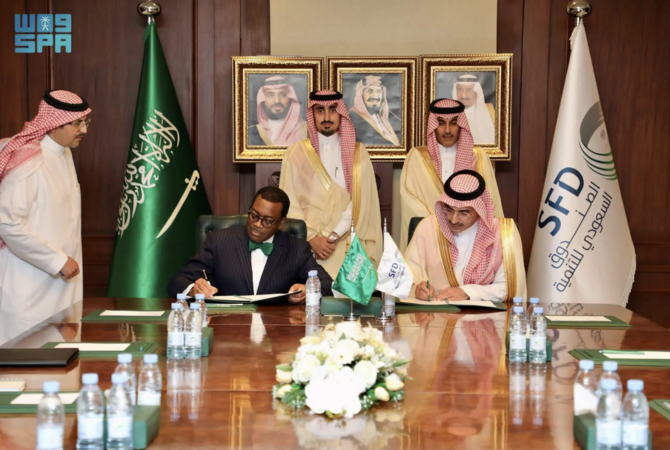
RIYADH: Emerging African economies are poised to receive a funding boost for growth initiatives following a deal involving the Saudi Fund for Development, aiming to foster sustainable progress.
The memorandum of understanding, signed with the African Development Bank Group, aims to promote mutual objectives and activities for sustainable international development between the two parties, the Saudi Press Agency reported.
This initiative aligns with SFD’s objective to enhance both social and economic growth by creating diverse opportunities.
Moreover, the newly signed agreement aims to facilitate the exchange of knowledge and experiences while advocating for optimal co-financing strategies. It will also support the attainment of sustainable development goals and optimize the impact of these initiatives.
Additionally, the MoU also aims to enhance collaboration in pursuit of shared goals that promote the expansion of crucial opportunities in diverse beneficiary African nations, ultimately contributing to global prosperity for the most impoverished and least developed communities.
Since 1975, SFD has played a significant role in strengthening sustainable development in emerging economies on a global level.
It focuses on improving living conditions, fostering knowledge development, capacity building, and providing job opportunities for individuals.
The fund has provided support and financing for over 800 projects and development programs, with a total value exceeding $20 billion.
These initiatives included a wide range of development and essential sectors that directly impact populations in over 100 developing countries.
In January 2023, the SFD ventured into the Caribbean region by signing an $80 million financing agreement for the expansion of the University of the West Indies at Five Islands in Antigua and Barbuda.
This funding was intended to be used to achieve sustainable development goals in the Caribbean, while also promoting scientific innovation and adding additional educational facilities to the university.
The financing agreement also included constructing seven energy-efficient buildings to accelerate the sustainability journey.
In May 2023, the fund signed two development loan agreements with Saint Vincent and the Grenadines, another country in the Caribbean.
The $6 million agreement was intended to fund the construction of a primary care center to improve the quality and resilience of the healthcare sector in the island nation. Additionally, the $10 million agreement was allocated to construct a cultural center and a market for craft and agricultural products in Belle Vue.
In August 2023, SFD laid the foundation stone to kick off the construction of the Mangoky Bridge in Madagascar, an island country lying off the southeastern coast of Africa.
For this project, the fund contributed $20 million as a soft loan, while the construction works also received assistance from institutions and development funds in the Arab Coordination Group and the government of Madagascar.
Upon completion, the Mangoky Bridge will connect the Atsimo-Andrefana and Menabe regions in Madagascar, and it is also expected to reduce the travel time between these two destinations, thus facilitating local farmers to get their produce to the market.
Saudi Central Bank and BIS co-host meeting on reserve management in Riyadh

RIYADH: The evolving global landscape presents new challenges and opportunities for central bank reserve managers, the governor of Saudi Arabia’s apex financial institution explained at a high-level meeting.
Speaking at an event in Riyadh which was attended by the Bank for International Settlements, Ayman Al-Sayari set out his view on the complexities of the current macro-financial environment.
The two-day gathering, which began on April 28, brought together reserve managers and experts from central banks in the Middle East and North Africa region, as well as participants from other apex financial institutions, to discuss the latest trends in managing foreign exchange reserves.
The event served as a platform for participants to exchange insights, perspectives and expertise on the most critical aspects of reserve management through a series of panel discussions and keynote speeches.
In March, SAMA’s monthly statistics bulletin revealed that foreign assets of Saudi Arabia’s commercial banks surged by 22 percent in February, reaching a total of SR347.63 billion ($92.7 billion) compared to the same month of the previous year.
This rise reflects a significant expansion in the commercial institutions’ international holdings and investments.
The central bank added that its net foreign assets reached SR1.55 trillion in February.
Central banks’ foreign holdings are primarily for reserve management and monetary policy purposes, while commercial banks’ foreign assets are for business operations, customer services, and investment activities.
The report added that Saudi Arabia’s total reserve holdings amounted to SR1.62 trillion, representing a five percent decline compared to the same month of 2023.


